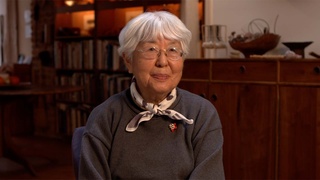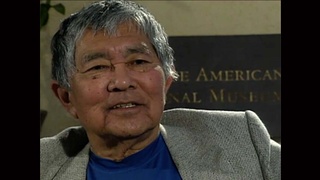Interviews
Her brother’s reasons as a No-No Boy
He had answered “No” to those two questions, because he said, “No, I’m a pacifist, I don’t believe in killing, and therefore I wouldn’t bear arms under any circumstances,” and the second, he said, “No, because I didn’t swear allegiance to the emperor of Japan in the first place, and so why should I forswear allegiance?” And so he answered “No” to the questions. And – as I said, apparently, nobody read the questionnaires after – we had left camp anyway.
So about a year – we were in Cincinnati for about a year, at University of Cincinnati, and the FBI came to his rooming house to ask him, with a copy of his questionnaire, to – if he would change his answers to “Yes.” And I remember Mike said he – said, “No,” he wasn’t gonna change it. And – and I remember yelling at him, I said, “What? Are you crazy?”
Of course he was expelled from the school. Because…the school – well he wasn’t expelled actually; they said that they were doing “sensitive war work on campus,” and therefore, the campus was “off-limits” to him. And so then he was not able to take his final exams at the end of his first year. And so then he failed all his classes. And so then he immediately – he left Cincinnati to go to Boston – he graduated from Boston University later.
Date: August 7, 2018
Location: California, US
Interviewer: Sharon Yamato
Contributed by: Watase Media Arts Center, Japanese American National Museum
Explore More Videos

The lack of discussion about family’s incarceration in Amache
Sansei judge for the Superior Court of Los Angeles County in California

Mother founded Japanese language school in neighbors’ backyard
Sansei judge for the Superior Court of Los Angeles County in California


Her grandfather was pressured to teach Japanese
Sansei judge on the Superior Court of Los Angeles County in California

Neighbor took care of her mother after grandfather was taken by FBI
Sansei judge on the Superior Court of Los Angeles County in California

Immediately after the bombing
(b. 1938) Japanese American. Hiroshima atomic bomb survivor

Other family members not as lucky
(b. 1938) Japanese American. Hiroshima atomic bomb survivor

His parents had little hope that he had survived the atomic bomb
(b. 1938) Japanese American. Hiroshima atomic bomb survivor

His views on nuclear weapons
(b. 1938) Japanese American. Hiroshima atomic bomb survivor

Loss When Leaving for Manzanar
Japanese American animator for Walt Disney and Hanna Barbera (1925-2007)

Forcibly deported to the U.S. from Peru
(b. 1936) Japanese Peruvian incarcerated in Crystal City

Stories of Grandfather at a concentration camp in Fusagasuga
(b.1974) Japanese Colombian who currently resides in the United States

Her grandfather in a concentration camp in Fusagasuga (Spanish)
(b.1974) Japanese Colombian who currently resides in the United States

Family welcomed at Crystal City
(b. 1936) Japanese Peruvian incarcerated in Crystal City

First meal at Crystal City
(b. 1936) Japanese Peruvian incarcerated in Crystal City
